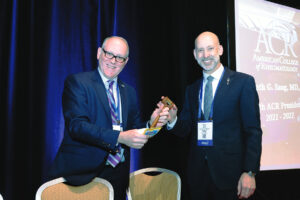Dr. White: One was while volunteering on the Alternative Payment Model work group (2016–18). We were basically tasked with thinking deeply about value-based reimbursement. The lessons learned from that continue to inform everything the ACR does on the advocacy front, so it was a valuable exercise.
I was also treasurer when the ACR decided to write a reserve policy. For that, the College and the Board of Directors had to carefully consider how much money we should save and when it is OK to dip into the reserve. Being part of that policy discussion was quite fulfilling. (Note: TR interviewed Dr. White about his role as treasurer in 2019; https://tinyurl.com/4v2f825p.)
A third highlight was being part of the COVID-19 Practice and Advocacy Task Force, which was one of the three main prongs of the ACR’s response to the pandemic (2020–present). During a time of uncertainty, we were able to share a lot of information with members in a timely fashion, including guidance on preserving supplies of hydroxychloroquine after President Trump’s suggestion that it worked for COVID and advice about how to keep your practice open—whether to wear a mask, install Plexiglas between the receptionist and the patient, and open or close infusion centers.

Kenneth G. Saag, MD, MSc, passed the leadership gavel—and anti-bacterial wipes—to Dr. White during ACR Convergence 2022.
TR: Speaking of COVID-19, how do you think the ACR and its members have weathered the pandemic?
Dr. White: I think COVID has been very hard on our community, but it also presented a series of opportunities for the field of rheumatology and the ACR. In the early stages of the pandemic, many of the therapies were aimed at the “cytokine storm” that was thought to be responsible for much of the mortality in COVID patients, so that put a lot of our drugs and our members in a prominent position in their home institutions and on national and international stages.
Ellen Gravallese, MD [ACR president 2019–20], David Karp, MD, PhD [ACR president 2020–21], and other leaders in the early part of the pandemic recognized a tremendous information need and responded by marshaling the forces of the College to generate as-solid-as-you-can-get recommendations for members in a time of great uncertainty, including when patients should hold their medicines, and when and how to vaccinate an immunocompromised patient, as well as steps to take when a rheumatology patient gets COVID. In that sense, I think we were strengthened by the challenge in many ways.



